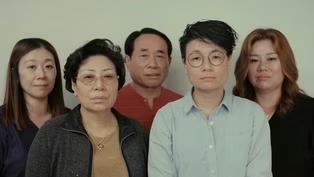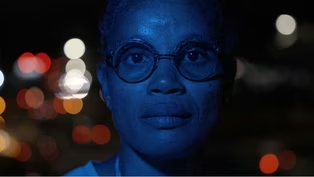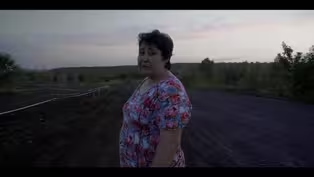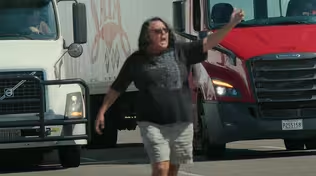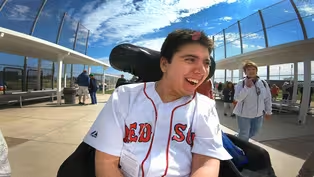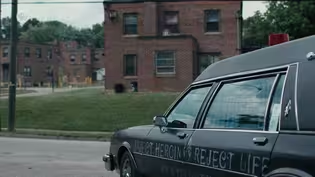
The Bitter Pill
Season 38 Episode 11 | 1h 22m 48sVideo has Closed Captions
A small-town attorney takes on pharmaceutical giants as opioids devastate his community.
With his hometown ravaged by the opioid epidemic, attorney Paul Farrell Jr. takes on pharmaceutical giants to secure funds for recovery efforts. When his innovative legal strategy catches national attention, the case transforms into America’s largest civil litigation. As stakes escalate, Farrell fights for justice—not just for his community, but for a nation in crisis.
Problems playing video? | Closed Captioning Feedback
Problems playing video? | Closed Captioning Feedback
Major funding for POV is provided by PBS, The John D. and Catherine T. MacArthur Foundation, the Wyncote Foundation, Reva & David Logan Foundation, the Open Society Foundations and the...

The Bitter Pill
Season 38 Episode 11 | 1h 22m 48sVideo has Closed Captions
With his hometown ravaged by the opioid epidemic, attorney Paul Farrell Jr. takes on pharmaceutical giants to secure funds for recovery efforts. When his innovative legal strategy catches national attention, the case transforms into America’s largest civil litigation. As stakes escalate, Farrell fights for justice—not just for his community, but for a nation in crisis.
Problems playing video? | Closed Captioning Feedback
How to Watch POV
POV is available to stream on pbs.org and the free PBS App, available on iPhone, Apple TV, Android TV, Android smartphones, Amazon Fire TV, Amazon Fire Tablet, Roku, Samsung Smart TV, and Vizio.

POV Playlist
Every two weeks, we curate a selection of POV docs, old and new, around a central theme. Stream while you can — until the next Playlist!Providing Support for PBS.org
Learn Moreabout PBS online sponsorshipMore from This Collection
POV Broadcast Feature Films.
Video has Closed Captions
A Korean birth mother and her daughter struggle to stay reunited for the long haul. (1h 22m 58s)
Video has Closed Captions
Poet and activist Staceyann Chin chronicles her journey of healing, forgiveness, and mothering. (1h 23m 5s)
Video has Closed Captions
Confronting war, Ukrainian artists pick up arms while finding strength through art. (1h 22m 41s)
Video has Closed Captions
An environmental thriller that shines new light on the human cost of coal. (1h 22m 58s)
Video has Closed Captions
In rural Mexico, a community seeks answers, uncovering alarming truths about their water. (1h 14m 47s)
Video has Closed Captions
After losing it all, Desiree Wood takes a second lease on life as a long-haul trucker. (1h 23m 3s)
Video has Closed Captions
A family’s free life in nature is disrupted by tragedy, forcing them into modern society. (52m 53s)
Video has Closed Captions
A new “innovation district” tests local democracy in a divided Brooklyn community. (1h 22m 31s)
Maya Lin: A Strong Clear Vision
Video has Audio Description
Follow the journey of Maya Lin behind the controversial Vietnam Veterans Memorial in DC. (1h 22m 54s)
Video has Audio Description
A community of disability activists help Samuel Habib, 21, navigate the path to adulthood. (1h 22m 44s)
Igualada: Refusing to Know Your Place
Video has Closed Captions
A Colombian Black rural activist's historic bid for presidency stirs a national awakening. (1h 19m 49s)
Video has Audio Description
Legend of Zelda streamer Narcissa Wright breaks records and finds love in the digital age. (52m 57s)
Providing Support for PBS.org
Learn Moreabout PBS online sponsorship♪♪ ♪♪ [ Dramatic music plays ] ♪♪ ♪♪ ♪♪ -I'm thinking it might be referenced in the document.
-I'm looking at the document.
I understand.
♪♪ -T-minus 10 hours.
10 hours... till opening statement.
♪♪ -The first federal trial involving the opioid crisis start on Monday.
Now, this case encompasses more than 2,000 lawsuits filed by states, counties, cities who accuse the companies of starting and sustaining the crisis.
It's described as "The most complex litigation ever."
♪♪ -It's a social compact.
So you come into my town and you dump 6.5 million pills, and my cousins, my brothers, my children, my neighbors suffer from it, how do I stop you?
Do I get out my guns?
No.
I seek justice.
That's what the court is designed to do.
♪♪ -The case has the potential to fundamentally shift the way this nation battles addiction, as well as alter the lives of millions of families who have been impacted.
-I'm not sure how to answer that question specifically.
-Well, you can say yes... -I understand that.
-...or you can say no.
-I understand that.
♪♪ -Do you believe that the actions that you or your company took contributed to the opioid epidemic, yes or no?
-No.
-And if it's not either one -- -No, sir.
I do not believe that we contributed to the opioid crisis.
-Corporations -- they don't respect these cases.
But what they can do is fear these cases.
And I'm going to expose to the entire country exactly what's happened for the past 20 years.
I've brought it to a head, bringing it to resolution.
It's going to get resolved.
It will be resolved in the next 10 days... whether you like it or not.
♪♪ ♪♪ It's Saturday afternoon.
What are you doing here?
-Just stuff.
What are you doing?
-Nothing.
Working.
-Mm.
-This guy's following me around still.
-[ Laughs ] -There's been a slow decay.
Like a lot of rural communities, the jobs have dried up.
Certainly, the coal industry has had its challenges, but I think it was the perfect storm with a lack of employment and a...ton of prescription opiates.
And, then, once that demon got ahold of its victims, you can't come out of it.
[ Dramatic music plays ] ♪♪ So this is the neighborhood I grew up in.
And right down here, this was government housing.
And I went to school with these kids, and, you know, you can see in the horizon, you know, this was a place for low-income families.
And these are kids I grew up playing baseball with, football, soccer.
And when we had that 24 people overdose in 3 hours, it was sold from right there on that corner to people.
And within 3 hours, 24 people overdosed.
[ Down-tempo music plays ] [ Siren wailing ] ♪♪ -Unit One.
-One.
♪♪ -We average three to five overdoses a shift, so this will be our fourth one for the night.
♪♪ -Careful.
-99.
-That's fine.
-Yeah?
You don't need to come back online?
-[ Crying ] ♪♪ -They've got a pulse.
-Copy, Two.
A or B?
-B.
-201 is on a traffic stop -- 1000 Ninth Avenue.
He's not responding.
-Okay.
Next overdose -- McDonald's on Fifth Avenue by Marshall University, So here, there's another one.
♪♪ -This is a war right now.
We can't arrest ourselves out of it, and we have to have treatment.
We have to have a full immersion of the community where everybody accepts that they have a responsibility.
That's why we have to have these programs in place.
And, I mean, right now, their funding has run out.
♪♪ -It's the perfect storm.
The state's broke.
The city's broke.
We're just trying to keep our head above-water as far as, you know, responding to calls, usually.
This last time I came here, it was I mean literally full of people.
But they've set up camp, and they're sleeping on beds, in makeshift beds.
That's where somebody's overdosed.
"This is my first and last holiday without my three babies."
She's referencing Thanksgiving 2017.
"I am literally dying inside without them.
To physically feel your insides ripping apart to the point of tears is the worst pain I have ever felt.
I know that I have messed up time and time again in my life and have been judged for it, but one thing I know in this world is the absolute pure love I have for my girls."
♪♪ "The only way that we will rise above this is if we get..." ♪♪ "...sober."
♪♪ ♪♪ [ Insects chirping ] -We want this epidemic stopped.
The symptoms are pervasive in my community.
The disease originates from one particular place, and that is the distribution of these controlled substances.
And so if we can control the distribution, then I think we can control the impact in our community.
[ Telephone ringing ] -Good morning.
Greene Ketchum.
I'm good.
How are you?
-It started with my own backyard in Cabell County, and I went to the county commission, and I filed a lawsuit against the distributors.
And it was the first of its kind.
[ Dramatic music plays ] When you look at the chain of distribution, everybody's aware of Purdue Pharma.
We all understand that there are pill mills and there are rogue doctors But what I think people missed was that there was a control valve established by Congress in 1970.
-The Federal Controlled Substances Act of 1970 is the comprehensive federal law which governs the manufacture, distribution, and prescribing of all legitimate drugs which also have a potential for abuse.
-Congress created this closed system where it doesn't go directly from the manufacturer down to the pharmacies.
It goes through the wholesale distributor.
They're not just delivery vans.
They were tasked with controlling the flow of prescription opiates.
And they got one job -- identify and report suspicious orders, which is defined as unusual size, deviation from normal patterns or unusual frequency.
And if you get a suspicious order, they have to halt the shipment and notify the DEA.
-They didn't do it.
They didn't do it.
We're declaring prescription opiate abuse and heroin abuse a public nuisance and a hazard to public health and safety.
We have the authority to file a lawsuit against those who profited the most at this link in the chain of distribution.
-Second and on is a recommendation as special counsel to the county commissioners to approve the filing of an amended complaint against all wholesale distributors legally responsible for causing or contributing to the opioid epidemic plaguing our community.
-I make that motion.
-Second.
-Aye.
-A dramatic new way in West Virginia to try and combat the epidemic.
On Thursday, the Cabell County Commission took legal action not against users or drug dealers, but against well-known companies who distribute prescription painkillers.
-We're taking on what is probably the biggest industry in the country and three Fortune 500 companies.
If my legal theory is right, I'm going to introduce them to the misery they caused.
♪♪ ♪♪ I have to warn you, my father was a fantastic lawyer and is currently a judge in West Virginia, but he has a major affliction that I'll feel better about it if I tell you about it in advance.
He's addicted to these enormous, two-story inflatables to put in the front yard.
[Dog barking] -It just makes people smile.
Yeah, so I've got them for all the holidays, be it the Halloween, I've got 18-, 20-foot witches.
We just hit a switch, and they come up.
[Birds chirping] [ Laughter ] -Well, I don't -- What I'm trying to do is not refer to myself as a hillbilly lawyer.
-No.
In the Huntington paper, you referred to yourself as -- -I know.
But, Dad, I got to kind of put it out there enough so that other people refer to me as the hillbilly lawyer so I don't have to.
-And I know that you've obviously spent a lot of time in the court, especially, though, your son.
[ Laughter ] [ Dramatic music plays ] -I met Paul in law school.
He was studying really hard and made "Law Review."
But I was, you know, a little more social, and [laughs] he was really busy as a young attorney trying to make a name for himself and to let everybody else see how smart he was and how good he was.
He had a lot of lawyers in the family, so he had to go out there and prove that he was as good or better than they were.
♪♪ -When he graduated law school, he came to work for my brother and I.
And so Junior was with us a couple years and then decided he wanted to become a plaintiff's attorney.
And when he left, I said, "Junior, a couple of simple rules in life."
I said, "You don't have to be an asshole to be a plaintiff's lawyer."
I said, "And don't tell anybody how smart you are.
Let them figure it out."
At breakfast, he said, "Dad, I broke both rules this week."
-[ Laughs ] ♪♪ -Back then, I felt what I did didn't make a difference.
I drank a lot.
I lost a connection with who I was.
♪♪ At some point in time, we take pause in our life, and we look and reflect upon where we've been, and we're disappointed.
♪♪ And so with this case, I'm representing my entire home community.
And I need to be sober to do that.
Now I'm suddenly feeling like I can make a big difference.
♪♪ -This kind of litigation takes a toll, because there's no break.
It goes on for years.
And so I think that he is single-minded enough and determined enough and confident enough to do this.
-There's never been this many defendants before ever.
We're gonna have 30 defendants.
-Four.
-Wow.
♪♪ -What are you going to do about the potential lawsuits from cities?
-Well, it's interesting that we're the target of the lawsuits.
Like I said, you know, we don't see the patient.
We don't prescribe the drug.
We don't dispense the drug.
And if you look at other litigation that's taken place in the space of healthcare, it usually has got something to do with behavior that is more patient-related.
[ Dramatic music plays ] ♪♪ -The distributors have been arguing with the DEA for a decade, saying, "That's not our job."
They say, "This is a doctor problem.
If a doctor writes the prescription, it's not suspicious."
If a pharmacy gets a prescription that's written by a doctor, and they fill it, and they have a DEA registration, it's not suspicious."
It defeats the entire purpose of having a closed system.
You're supposed to be watching so that if one particular pharmacy in a town of 50,000 people is selling a million pills a year, that's a problem.
-How do you respond to critics who say McKesson helped to fuel the opioid epidemic by failing to flag suspiciously large opioid shipments, as required by federal law?
-Well, we flag hundreds of thousands of shipments every year that we consider to be suspicious.
But probably more important, we provide data to the DEA every night out of our facilities on every transaction that we have.
♪♪ -Every transaction, from the manufacturer to the distributor, from the distributor to the pharmacy, has to be reported to a database.
It's called ARCOS -- A-R-C-O-S. We're talking about 30 million transactions a year.
♪♪ If we get the data, we're going to be able to track the obnoxious sales of opium pills, and we're going to find that the industry didn't halt the shipment, perform due diligence, and notify the DEA.
♪♪ We want access to that data.
They won't give it to us.
They said it's privileged.
So that's taken six months just to be able to get to the position where I can fight for it.
Where is that?
-Yeah.
♪♪ -Today, we have authority from the court to issue the subpoena to the DEA, and it will be the first subpoena in the history of America that gets access to this data.
♪♪ Hit the send button?
-[ Laughs ] Go for it.
-Thanks for all your help.
-You're welcome.
-Six months, all to push the send button.
-I know, I know, crazy.
-I want to thank everyone for coming to the press conference.
Today, Buncombe County has filed a lawsuit against the drug manufacturers and wholesale distributors that are responsible for fueling the opioid epidemic in our county.
We have engaged outside counsel, and they have agreed to pay all of the costs associated with this litigation.
[ Indistinct conversations ] -Hey.
I'm Paul Farrell.
-My God, it's good to see you, Paul.
-Nice to see you.
I'm from West Virginia.
-Okay.
-I'm one of the guys that started this mess.
-Nice.
-And we have a subpoena to the DEA that's already been issued, and as soon as Judge Sargus gets it and we get the national database, it's gonna blow this thing completely off.
It will be amazing.
As this drama has played out, I started getting phone calls from the neighboring states and counties.
[ Dramatic music plays ] ♪♪ And so I started to go into these jurisdictions and say, "Nobody else is getting the data.
I'm going to get the data for you.
I know the pathway."
And it became clear to me that if I was going to expand this litigation on behalf of other communities, I was going to need help.
♪♪ Amy Quezon -- fantastic trial lawyer, passionate.
She has made this her cause.
-Last year alone, we had a 35% increase in Florida in opioid-related deaths.
So unfortunately, this epidemic is not going anywhere, and it's continuing to kill our citizens.
-Mike Fuller is her boss.
Mike Fuller has vision.
He has the vision to be able to understand the architecture of what we're doing and then implement it.
-80% of heroin users first abused prescription opioids.
So you're going to see that tide change.
You're going to see the switch from legal prescription drugs to the illegal narcotics.
Did I sound professional up there?
-You're kind of boring.
-Yeah.
Well, that's good, though.
-You need to be a little more animated.
-That's true.
-Peter Mougey -- he understands data.
He understands statistics.
-We don't have enough infrastructure.
We don't have enough first responders.
And every day in our communities, people are dying.
-The public-nuisance cases that we started here in West Virginia have legs.
And there's a serious reckoning with the industry.
-The City of Cincinnati is suing three drug wholesale companies, accusing them of flooding the city with opioids and actions that led to serious public-health crisis.
-If I'm right, this isn't a $600 million problem for the companies in West Virginia.
Could be a $600 billion problem for them nationwide.
-When I realized how big it could be, we were at Hill Peterson's office, and somebody said, "Let's call Mike Papantonio from Levin Papantonio, get him on the line to see if there's any interest."
And I was like, "Ha!
Yeah, let's do that.
And I'll get the Pope on my phone."
-If the judge tells him, "You're gonna try 20 cases in 20 states in the next 20 days," he'll nod and say, "Done."
He'll put the teams together.
That's the war machine he's built.
-The opioid crisis isn't being caused by guys standing on the corner in trench coats.
It's being fueled by corporate executives in Armani suits.
-Alright.
Sounds good.
-You're in charge, Paul.
-Yeah.
-Get your...together.
-I don't think that was the conclusion.
-Oh, I think it was.
-No.
-You can quit with that.
You don't, "Oh..." -Hey, hey.
You wanted to make sure it didn't get out of control.
Now you're in control.
-We are sort of transitioning from signing cases up into finding the experts that we are considering using to establish our damages for the various communities.
-Talk about the mechanics of how the molecule itself works.
What does the drug do when it gets into the brain?
-There's a certain amount of dopamine we need to get up in the morning, right?
There's a 50-nanogram-per-deciliter threshold.
This is the amount that gets us up, gets us coffee, and gets us home.
Then, best day ever -- you win the lottery, you have 2% body fat, and you own an island all in the same day, right -- well, that's about 100 nanograms per deciliter.
At 40 and 100 -- and no matter who we are, we live somewhere within this.
The problem is is when I introduce oxycodone, instead of 100 nanograms per deciliter, what I end up with is about 1,100 nanograms per deciliter.
-Wow.
-The next time you use that drug, it decreases, and it's only here now.
What my patients will call this is chasing the dragon.
They can never, ever get that same bump again, because the first use, the body changes the amount of dopamine released.
Tincture of opium was developed in the 1800s, and we knew 100 years ago that this was a bad idea, and we knew it with molecules that look almost exactly alike.
You can destroy them with the data.
The data doesn't back up a damn thing they did.
There's not one time in history that the data actually supported any of this.
-We got to go to trial.
-Think we kind of glanced over it when Corey said, "You have to tell the difference between pain and suffering."
-Mm.
Wow.
That is correct.
-And he said, "You can't treat suffering with a pain pill."
-Yeah.
-But that's what they were doing.
They were treating suffering.
-Yeah.
-Really, we could have done this out here, too.
-Alright.
I'll see you all later.
-See ya.
-Good night.
-[ Laughs ] -Did he bring the little, tiny water gun in?
-He probably did.
I didn't see it 'cause he usually keeps that in his -- -Car.
-Yeah.
My husband and I for probably about the last six years, we have been foster parents.
Then we started hearing from our caseworker that the foster-care system was just flooded with kids in need.
It was the opioids.
It was the pills and then the heroin that came on the tail end of the pills.
And they couldn't find anybody clean to put the kids with.
1...2...3.
Flip.
-And we ended up with a little boy whose mom was addicted.
She's a sweet young woman, but she just could not beat the addiction.
And I don't know where she is now.
Let's see who won.
Ultimately, they terminated her parental rights, and he's just now starting to figure out -- sorry -- ♪♪ -- that I'm not his biological mom.
So he asked me, "Can we go find her?"
And I said, "I don't know how."
And he just started crying, 'cause, I mean, how do you not know where your mom is, you know?
And those are conversations that we're just gonna have to keep having.
-Thank you.
-You're welcome.
From a big perspective, I've seen what it's done to communities.
On a close-up perspective, I've seen what it's done to people and somebody I love dearly.
So it's really sad, But, then, when you get down to the core reason why all this happened, that's when you get pissed.
I love you.
-Love you.
[ Mid-tempo music plays ] ♪♪ -When I open a case, I say, "Don't take my word for anything.
All you got to do is follow what the documents tell you," But let me show you something.
You're gonna be interested in this.
This was produced by the CDC, and if you look at this dark orange right here, that's telling us that you have 30 people dying for every 100,000.
I call it the death map.
They don't call it death map, but in trial, it will be known as the death map.
They've got it down to such a science.
This is 1999.
This is 2009.
McKesson knows.
Cardinal knows.
Amerisource knows.
Purdue knows.
All of them understand what this death map means.
This isn't Joe Lunchbucket making these decisions.
These are people that are trained to understand statistics.
They're trained to understand dynamics of demographics.
You don't think somebody said, "Hey, you might want to take a look at the death map, 'cause the death map is telling us what's happening"?
-Understanding this complex system has been difficult because much of what happened has been behind the curtain.
And so part of the process of this is for us to pull the curtain back.
We're looking for complete transparency.
[ Dramatic music plays ] There appears to be some joint effort by two of these different links in the chain of distribution that gave them both knowledge of what was going on.
-They're working together.
We have evidence of manufacturers training reps at distributor companies on how to sell opioids.
In every link of the chain, you see people that were incentivized by compensation.
So, for example here, it's an e-mail from a Mallinckrodt sales rep. "Keep them comin'!
Flyin' out of here.
Its like people are addicted to these things or something.
Oh, wait.
People are."
Response -- "Just like Doritos.
Keep eating.
We'll make more."
♪♪ -This wasn't an accident that happened.
This was part of a complex business plan to sell as much opium in America as possible.
So today we're filing to merge together the claims against the manufacturers and the distributors, combining them all in front of one judge.
And that's what we call an MDL, and it stands for Multi District Litigation.
-We are saying they conspired to sell drugs for other than medical purposes, to sell them illegally, that they were acting sort of like a small drug cartel.
-Purdue Pharma is currently being sued and is reportedly considering bankruptcy to protect their assets.
Well...that.
-This year could see the culmination of a flood of lawsuits, all seeking accountability for the epidemic and trying to secure more money to treat its victims.
-In Huntington, West Virginia, we've received a lot of media attention about the plight that we are facing.
We're no longer waiting on the federal government.
We're no longer waiting on the state government.
As a community, we're finding a solution.
So this local cause has now expanded into the largest MDL in the history of our country.
The primary focus of today's congressional hearing is the result of what we've been doing in Huntington, and that is we've been examining the distribution and how the volume, how the flood happened.
Congress has asked and brought into the hearing today five C.E.O.s.
-First today, we have Dr. Joseph Mastandrea, chairman of the board at Miami-Luken.
John Hammergren, chairman, president, and C.E.O.
of McKesson Corporation, George Barrett, executive chairman of the board at Cardinal Health.
Steven Collis, chairman, president, and C.E.O.
of AmerisourceBergen Corporation.
And finally, J. Christopher Smith, former president and C.E.O., H.D.
Smith Wholesale Drug Company.
-Today, a thousand people will go into emergency rooms overdosing on opioids.
Today in America, 115 people will die from opioid addiction and overdose.
-We want to know what these companies knew about the rise of the opioid epidemic, when they knew it, and whether it informed their distribution practices.
-If you would please rise, raise your right hand, and I'll swear you in.
Do you swear that the testimony you're about to give is the truth, the whole truth, and nothing but the truth?
♪♪ You may be seated.
♪♪ I'd like for each of you to answer each question that I'm going to ask now.
First, do you believe that the actions that you or your company took contributed to the opioid epidemic?
Mr. Barrett.
-Um -- -We're really looking here, because I've got a lot of questions, yes or no.
-No.
-And if it's not either one -- -No, sir.
I do not believe that we contributed to the opioid crisis.
-We'll come back to you, then.
Dr. Mastandrea.
-Yes.
-Mr. Hammergren.
-No.
-Mr. Smith.
-I believe H.D.
Smith conducted itself responsibly and discharged its obligations.
-Is that a no?
-That's a no.
-Okay.
Mr. Collis.
-No.
I believe we -- It's a no for AmerisourceBergen.
-In this case, as it turned out, there was a bad actor in the area, a doctor, which we later found out, which is why we stopped shipment.
But today's systems would simply stop that.
-I think the thing that would continue to help us is if we can put physicians in a place where they have more information when they're prescribing and certainly at the pharmacy level help the pharmacies understand red flags of patients that may be getting multiple doses in different directions.
So I think there's more that we can do as an industry.
-Since 1971, your companies are required by federal law to halt and report suspicious orders.
Did you, before all of this broke, have a process to do that?
-We do as much due-diligence investigation as we possibly can.
-Was it that the profit motive simply overcame because you were making so much money?
-Was anybody fired?
-Congressman, people are different today.
Many of them left the corporation.
-But they weren't fired.
-We don't talk about specific -- -I'm not asking you to talk about specifics.
I'm asking you to tell me if anybody got fired.
-Why did you ship 5 million pills?
-I don't think we can know for sure.
-I believe we have a robust system and we've always had one.
-I don't feel qualified to give a percentage.
I can only repeat what I've said about... Actually, we don't have access to that information.
-It's difficult for us to get accurate information on that.
♪♪ -Now the chair will recognize the gentleman from West Virginia, Mr. McKinley, for five minutes.
-I'm from West Virginia, and we've been hearing about it all day today.
The fury inside me right now is bubbling over with how we're gonna address this problem.
And for several of you to say you had no role whatsoever in this, I find it particularly offensive... when we've had over 900 people a year dying in West Virginia, and deflecting responsibility, saying, "I just had to fill the order."
No.
You had a role.
You had a role.
What's the account of it?
What's the punishment that fits this crime -- Just a slap on the wrist, a financial penalty, or should... there be time spent for participating in this?
I am so frustrated for the people in West Virginia and across this country that you all have not played and stepped up... took more responsibility for this.
I yield back my time.
[ Dramatic music plays ] ♪♪ -With that, subcommittee is adjourned.
♪♪ -So it's evident that they were shipping suspicious orders, so now we just have to establish it on the record.
And so it's very clear how they're prepared, what their lawyers are telling them, how they're trying to obfuscate or avoid being pinned down.
And when they do get pinned down, they squeal like pigs.
You saw today, there are some Fortune 50 companies that have some serious issues.
But just to be blunt with you, too, my eyes are not on a settlement check right now.
That's not how I practice law.
The way I practice law is I build my case.
And if you want to settle, you can come and settle with me.
But until that day comes, you're on the clock.
We're going to trial.
♪♪ ♪♪ -The next item on the agenda is discussion from our attorney Paul Farrell on the opioid litigation.
So at this time, I'll call on Mr. Farrell.
-As you know, there's about 1,800 cases that have all been consolidated now and sent to Cleveland, Ohio, to one federal judge.
So the bellwether that was selected to go to trial was Cabell County and the City of Huntington.
So of the 1,800 cases, we'll be in the batter's box, and now we have the opportunity to show the world how it is that we rise from the ashes.
So, our community knows this tragedy.
We rose from the ashes once before, and I'm intent on bringing about a reckoning for us to do it again.
-We have Mr. Farrell with us.
Did you want to speak, or did you just come to make your... -Oh.
-I see him so rarely, I thought I could... [ Laughter ] ...try to have lunch.
But I was told that he is... -Headed to Dallas.
-...headed to Dallas.
-So, hi, Dad.
[ Laughter ] -He is exhausted.
It's emotionally and physically exhausting, the amount of travel he has to do.
And he's gone from, you know, a very good lawyer in West Virginia to now a national very good lawyer.
That's a big jump.
-I have sent letters to Cardinal Health, McKesson, and AmerisourceBergen.
These are the drug distributors who flood our state with pills that they knew far exceeded legitimate medical needs.
Okay.
Thank you all very much.
-Currently, there are attorney generals across the country that are at various stages of filing the same claims that we're filing.
Traditionally, the AGs say, "We'll act on everybody's behalf," and nobody ever thought that a county or city could bring suit themselves.
-We're very open to negotiations.
I've always felt that we needed a critical mass of states to file suit.
I felt that with Ohio being the first big state to get in, that it would cause other attorney generals, other governors to really look at this issue again.
-Let me stop a minute.
♪♪ -The federal court cases that are filed on behalf of the cities and the counties, how does North Carolina work?
-Actually, I'm gonna pass on that one, because it's a litigation-related question.
-If the money goes to the AGs, it has to go into the state treasury, and then the state legislature can spend it however they vote.
And so the primary motivation for the AGs right now is to shut us down.
They want the money to be able to do state-run programs on roads and bridges and pension funds so that they can wave a banner, because AG stands for "aspiring governor."
[ Applause ] ♪♪ I feel like that I've built this incredible team of basketball players, and we've made it all the way to the playoffs... and now Charles Barkley wants to come out from the news-anchor desk and put on a jersey and be the captain of the team.
♪♪ His time has passed.
They all want a seat at the table.
Question is, whose table is it?
It's my table.
[ Power tools whirring ] -"Hometown lawyer is suing the nation's largest drug companies over the opioid crisis."
It says, "Farrell is built like a wrestler, and his head has a severe, boot-camp buzz cut, which combined with his blunt speech, adds extra punch to his comments, like, "I'm on a war front."
-The structure of an MDL and who is appointed in leadership and who is on the team is critical to the success of a case, because there's hundreds of lawyers working on this.
Because what we're doing, really, is creating a big, mega law firm out of a bunch of people from around the country who in the ordinary situation, are competing with one another, So it's a challenge.
[ Indistinct conversations ] ♪♪ -The other thing I was thinking, too, is that we should add in -- We need to add in Paul introducing himself at the beginning.
-For sure.
-Along with the egos that we see with the lawyers that are working a case like this, the risk is enormous.
Just speaking from a single law firm, it costs millions of dollars.
We don't recover anything unless we are successful in this litigation.
Every plaintiff firm here is fronting the money.
In the 9/11 cases, my partner Paul Hanly and I had to sign our houses to the bank so that we could fund that litigation and do what we needed to do for our clients.
It's why we need the need the number of law firms that we do in order to challenge what the defendants have.
And they have all the money in the world.
♪♪ -Struggling.
This is the most expensive case we've ever had.
Usually bringing in a substantial amount of money representing clients in West Virginia, and for the past... ...two years in January...
I haven't hit a lick.
I'm working on this case, so they're having to float me.
I think they'll tell you, it's kind of tough.
[ Mid-tempo music plays ] ♪♪ -His mind, even when he's here with his family, never really stops.
I mean, it doesn't even stop when he sleeps.
I'll wake up at 2:00 in the morning and think, "What in the world?
Did I leave a light on?"
And he's on his phone, returning e-mails.
I mean, he's on 24 hours a day, 7 days a week.
[ Mid-tempo music plays ] ♪♪ -I have a good friend, and his oldest daughter got hooked on pills and then on heroin, so they forcibly took her to rehab.
She was in for 30 days, and on Sunday, they had a big family dinner to celebrate her sobriety.
And, then, Tuesday morning, they found her dead in her grandfather's bathroom from a heroin overdose.
♪♪ Trial wasn't in time.
♪♪ There's a fatigue that sets in.
If what I've done for the last two years is all for naught, I'd rather this fail sooner rather than later so that somebody else can figure out a better way.
♪♪ -♪ Sittin' on a roller coaster ♪ ♪ Holdin' on for dear life ♪ Sittin' on a roller coaster ♪ ♪ Holdin' on for dear life ♪ ♪ I know what is what ♪ ♪ I know who you are ♪ ♪ I know what is already gone ♪ ♪♪ ♪ Everyone was wrong ♪ ♪ They were on the ledge ♪ [ Siren wailing ] ♪ Everyone was only dyin' to live ♪ ♪♪ ♪ Ooh, ooh ooh ooh, ooh ooh ♪ ♪ Ooh, ooh, ooh ooh ooh ♪ ♪♪ ♪♪ -What I want is the transactional data.
I sent Freedom of Information requests.
I sent a subpoena.
I drove to Washington, D.C., and knocked on the door and said, "Can I meet with the head of Diversion Control?"
I called my U.S.
Senator.
I mean, what more do I have to do?
Today, we went to see the judge, and I'm like, "Listen.
This is mandatory reporting data from American industry to the federal government."
They don't have a choice, right?
The law says they got to report this data.
So my government has the data that reveals what happened in my community, and I want the...data.
♪♪ ♪♪ Peter, on Friday we're gonna get the ARCOS database, so we need to make our own internal assessments as to what we're gonna do, but we also need to come up with a protocol to roll it out.
So the dissemination is gonna have to be hard disk or thumb drive and not online or the cloud.
[ Dramatic music plays ] -Documents are always what drive litigation numbers.
It's always what drives the truth.
People can say whatever they want about what they did or didn't do, but the truth always comes out in the paper.
-What we're looking at now is behind the scenes, every single one of the actors that were participating in and contributing to this natural disaster, which is the opioid epidemic.
This is why it took an army of lawyers to get the data, because once we have it, now it's game on.
And it looks like this.
We were able to identify the fields -- which distributor sold it, which facility they used, who they sold it to, the product name, the ingredient levels, so we then had to take all of this enormous data and understand it.
So, this is an example of a chart that we have done for a particular pharmacy in West Virginia.
Now, this community has 1,700 people in it.
In 2006, this pharmacy ordered 250,000 oxycodone pills.
Town of 1,700.
The next year, they ordered 300,000.
The next year, 400,000, the next year, 500,000, and the next year, 600,000.
Now, if we just took the 250,000 pills alone, by itself, in a town of 1,700... you have to ask yourself, "Is that suspicious?"
Their job was to identify these anomalies and block them.
And there's absolutely no question they didn't do that.
They just didn't.
I think we've got it.
I think we're there.
I think that what the issue is, is just being comfortable that we've captured enough of the data set to be able to tell the complete story.
[ Mid-tempo music plays ] ♪♪ ♪♪ -The strategy of the defense in this case is just to be obstructive.
There's no way they win on the facts.
What the defendants have done in this case is they have marked everything "Confidential," because they don't want the country to see what they did and what they knew they were doing.
-What's up, boss man?
-Does Cardinal believe that the Controlled Substance Act was to protect the American people from the illicit distribution of controlled substances, yes or no?
-Objection -- form.
Objection -- scope.
-I can't opine in my personal capacity on what Cardinal believes, Cardinal understands its obligations under the statute.
-We started this, I think, at 9:00 a.m. Mike Fuller spent from 9:00 a.m. until 1:30 arguing with her, where she literally wouldn't answer any questions.
We took a lunch break, and I came back, and I said, "I got to jump in."
Does Cardinal Health accept or reject the fact that as responsible members of society, they have a duty to guard against diversion?
-Objection -- asked and answered.
Objection -- scope.
-Cardinal Health has regulatory and legal obligations that it must comply with in performing its services, which is what it does.
-Yeah.
We're gonna get to your tag line later.
Again, your answer is clear before.
You don't have to repeat it.
You can just say "ditto" to save time.
I'm asking you whether or not you acknowledge that as responsible members of society, you have a duty to guard against diversion.
-Objection to form, asked and answered.
Objection -- scope.
-Let me give you a hint.
I'm not gonna ask you a question that I probably don't know the answer to.
I'm gonna ask you for a third time, do you agree with this statement, yes or no?
-Objection to form.
Objection -- asked and answered.
Objection -- scope.
-No.
I don't believe there's a duty.
-You know what?
I'd like to take a break.
I would like to go off the record.
-Time is 1:32.
Going off the record.
-This witness was not gonna concede anything.
She wasn't gonna concede she had a duty.
She wasn't gonna concede that they did anything wrong.
She wasn't gonna concede the DEA had any authority over them, basically.
I mean, it was awful.
And so I ran out a little bit of patience.
They got mad at me and stormed away and went and called the judge and said I was being rude.
Long day, brother.
That was a tough, long day.
Cardinal Health just does not want to roll over and let us tickle its belly, does it?
-No.
But now we know how they play.
[ Mid-tempo music plays ] ♪♪ I'm telling you, it's gonna go very, very poorly for them tomorrow.
I just want the opportunity to talk to this guy.
Every time I concede or try to work with him, I get...
Does McKesson believe that opioid sales are related to opioid deaths?
-Objection to form, outside the scope.
-Can you ask that one more time, please?
-You've already testified, sir, that shipping suspicious orders isn't necessarily maintaining effective controls unless you're going to look into them.
You used to be a law-enforcement officer.
I used to be a prosecutor.
You and I both know there's no way to do a proper investigation of all these with three people, correct?
-Object to form.
-Yeah.
I agree.
-As a distributor, we don't manufacture prescription drugs.
We don't market them to doctors or patients, nor do we market any particular category of drugs, such as opioids, to pharmacists.
-We have documentation that suggests they do.
-Do you think McKesson is partly responsible for the societal costs of prescription-drug abuse in America, yes or no?
-I'm not sure how to answer that -- that question specifically.
-Well, you can say "yes"... -I understand that.
-...or you can say "no."
-I understand that.
-If a distributor repeatedly fails to report suspicious orders, do you believe it should be held accountable for the societal costs of prescription-drug abuse?
-Objection to form.
-I would say yes, partially.
-In the beginning of this case, people were like, "Who in the hell is this kid from, you know, small-town West Virginia?"
He didn't have that big-town pedigree, but there's a lot of plaintiff lawyers that have that drive that makes you stay up all night to look at documents because you don't want to be outshone by the big, ivory-tower white-shoe lawyer, and there's no doubt in my mind that -- that Farrell's got that chip on his shoulders.
-I see a pathway to closure, right?
And it's immediate, it's abrupt, but it's decisive.
And I just can't get the court to address in that manner.
There have been six months now of settlement talks, and nothing's happened.
This coming meeting was the first opportunity that probably the four biggest players in the litigation each had separate meetings with the judge, plaintiffs.
15 minutes before the first meeting started, I was informed that my presence would not be required.
And I did not take that very well.
But I understand the wisdom in it.
I understand I have just come off of two weeks' worth of depositions that I was fairly aggressive with.
And to bring the gorilla into the room when we're trying to begin the process of peace, probably... not the best idea.
♪♪ -The three largest drug distributors -- McKesson, AmerisourceBergen, and Cardinal Health -- are close to a potential settlement worth $18 billion.
-The judge called in the Big 3 distributors and their C.E.O.s and the AGs, and they took the position that they should settle and the states should get all the money.
-And this afternoon, the state attorneys general said they'd reached a broad settlement framework with five companies.
-These cases should not be settled absent a total and complete disclosure of the internal documents of these companies.
There is a history here, and we cannot allow that to be buried.
-The federal judge in the case is trying to settle all 2,000 cases, but it's a very fluid situation, and the question for the small, particularly, cities and counties is, "Are we really going to see that money?"
-We've negotiated a framework, and the vast majority of states representing the vast majority of people in the country are on board, but not everybody is yet.
-The Attorney General of North Carolina is going to go back to his constituents and say, "Y'all need to dismiss your cases, and, just like in the old tobacco-model days, I'll be allocating the money out through my office."
Under this allocation, the attorney generals decided that West Virginia would get .89%.
With Cabell County having a population of 100,000 and the state have a population of 1.8 million, they're going to get $135,000 a year every year for 18 years.
This is a nonstarter.
I'd rather get nothing and go to trial and put on -- on in the front of the whole country, put on the evidence of what these sons of bitches did to my hometown.
Tell me if you think I'm bluffing.
♪♪ -Yeah, and that's the A-list.
-We know that the opportunity that we have here is to send a message to the world.
Now, I know there was a lot of conversations about the possibility of a settlement.
I don't want one.
-How do you really feel, Mayor?
[ Laughter ] -Amen.
-I want... -Amen.
-...to be at trial.
-They don't know us very well, do they?
They misjudged.
-Mm-mm-mm.
-Whatever they did, they'll rue the day.
-You know, your first responders, you know, they feel like they have on capes.
They didn't cause the problem.
They're there to make it better, if they can, and the collateral damage that has been done not only to your first responders, but to the family members here, until you've picked up one of your own and put them in a body bag and carried them to a hearse, you know, how do you put a number on that?
We had a firefighter commit suicide October 3 of 2018.
The next month, a paramedic committed suicide.
In -- In January, a 911 dispatcher committed suicide.
You know, we have all banded together.
We have incredible people here that are working.
But you know what?
It's not e-freaking-nough.
Somebody has to freaking pay for this.
I don't know where it ends.
I don't want to settle, either.
It's about being compassionate, about doing the right thing, right by these people, right by us, right by humanity.
♪♪ ♪♪ ♪♪ -[ Sighs ] Voilà.
This is my kids' crib, all three of them.
Kids are gone, and so if I can sell my West Virginia home... maybe get someplace small up by my parents... and then I can free up a couple of hundred thousand dollars to invest back into the opioid case.
♪♪ I've spent every penny I have, borrowed, begged to finance this thing.
I was the primary source of revenue for my law firm.
For the past three years, I've done nothing but my opioid case, so it put a great financial strain on everybody that was dependent upon me, and eventually, it fractured my law firm, so I had to leave.
So at the end of the month, I'll be opening up Farrell Law.
This case completely absorbed me, and I'm going to bring it to some type of magic or tragic ending.
-Alright.
-How come I can't print?
-I don't know.
Where are you trying to print to?
-I don't know.
Do I have a printer?
Oh, I firmly believe that this case will resolve if we get a trial date, and so, in order to get a trial date as soon as possible, we agreed to waive a jury trial.
By waiving the jury trial, it expedites and compresses a lot of the discovery that they want to do and allows us to begin as quickly as possible.
I want to get up in front of the judge now.
What I proposed was, I proposed that we do a bench trial, but the judge determined instead of a jury, which is the opposite of conventional wisdom.
If I can get a bench trial, I can get in front of the judge in the next couple months.
If I get a jury trial, it's going to take me a year.
I can't wait a year.
[ Siren wailing ] ♪♪ ♪♪ -Opioid addiction was a health crisis before the pandemic.
During the pandemic, things got worse.
There are more than 40 states have reported increases in opioid-related deaths.
-People can't get to counseling.
They can't go to their meetings.
We've got a pandemic, but we've had an epidemic here for years that has killed more people, certainly, than COVID in this area, so we're taking depositions in ballrooms so as not to lose our trial date.
♪♪ -We have tens of millions of documents.
You obviously can't tell a story with tens of millions of documents.
You need 10 documents.
-What happened in the Cabell-and-Huntington case, it was represented that most of the discovery was done, and then we learned that there was a lot of documents that weren't produced, so a lot of the trial will be these documents that haven't really seen the light of day.
So, it's an e-mail from these two top guys at AmerisourceBergen.
They're joking about OxyContin for kids being approved by the FDA and saying like, "Oh, yeah, just what we need -- another generation addicted."
And then it's a cereal box of, like, Sugar Smacks with the frog on it, but he's holding, like, a syringe, you know, "pure, uncut horse."
Like, just, you couldn't get, like, any more gross.
One of their defenses is, "Well, these folks are all addicted to heroin.
We don't make heroin."
Our point is, y'all are talking about OxyContin, and then you're putting it in the context of heroin, so you know what your pills do.
-What's particularly disturbing is, it was the people in charge of protecting our community from the pills.
It was the highest levels of management for controlled-substance monitoring.
Facts are very stubborn sometimes, and this fact is going to come back to haunt them.
♪♪ ♪♪ We're four weeks out from trial, and my biggest fear is that I don't get transparency with the release of all the documents into the public record, that I don't get accountability because there'd be some settlement with some magic language, and that all I'm left with is some type of bitter pill.
♪♪ ♪♪ I think that's everything.
♪♪ I think they know they're going to lose, so this week, there will be renewed settlement discussions, but if we get to a point where they settle, all I'm saying is, is I want as much in the public record as possible.
-Where do you think?
-I like the image.
Like, I would maybe put the graph that shows more pills, more overdoses, more deaths, those three up.
-You'd have to be inhuman not to have nerves.
I always kind of analogize trying cases to like a sporting event.
Your heart rate's going.
Your adrenaline's going.
-Can I see what you just had there?
-Yeah, sure.
-Why -- why hasn't someone shown me this?
-I just thought, you know, "Isn't that a coincidence?"
-Everybody deals with the stress differently.
Some people exercise.
Some people eat.
Some people, you know, stay up all night and read.
Some people go to bed early.
-And we can track every pill they sold into Cabell County, to the pill, to the day.
-This is the biggest MDL maybe ever.
We're going to take so much information, so many documents, so many deposition testimonies, and boil it down into an hour and a half.
Tensions are high.
-All that is swell except for guess what's not in the...record anywhere.
The document I want to use.
-We can go back to doing things the way you were doing with Pearl, and now I am here to help you build these out and help you never have to worry about what number something is.
I am going to be the person who tells you that, and then you're going to put the show on.
-I want you to get it for me so I can use it in court.
-I know, so that's why I don't want you even worried about it anymore.
It's over.
-The first set of facts are going to be things that the defendant said to the DEA.
-Paul has waited a long time to get up and say what he's going to say in front of those companies.
I cannot really imagine when it's your hometown.
Not only do you have, like, the biggest defense firms all looking at you, but you also have your mom and dad.
That's an extra layer that I don't think you typically have to deal with in a trial.
-He's here to save the world, but his mother will make sure he has clean underwear when he does it.
-That's right.
-It's important, right?
-So, we have -- Thursday, Friday, Saturday, Sunday, Monday -- five days till trial starts.
The way the deal is structured, from our perspective, it's dead.
We're fixing to go to trial against the Big 3 here in West Virginia.
We're going to pop them here.
If people start to rack up verdicts, the Big 3 are going to go into bankruptcy.
♪♪ -I think that's really close.
All I need is the inspection warrant.
-The one I just sent you?
-Mm-hmm.
-Okay.
But Pearl put it in there.
-What if it's not in there?
-Then where's that other one?
You know?
-Do you not want this one?
Oh, okay.
-T-minus 10 hours.
10 hours till the -- till opening statement.
We're going to have moments where we get hit in the mouth and our plan goes out the window.
We're going to have, you know -- We're going to have stress.
We're going to have doubt.
We're going to have to adjust and react, you know, but we're prepared.
♪♪ ♪♪ ♪♪ ♪♪ [ Gavel bangs ] -May it please the court, we have the great honor of representing the peoples of Huntington, Cabell County, West Virginia, in this first trial against the distributors of prescription opioids -- AmerisourceBergen, Cardinal Health, and McKesson, collectively referred to as the Big 3.
We are not only the epicenter of the opioid epidemic, but the epicenter of the fight back.
More than 3,000 cases have been filed across the country, and we have the honor of being the first case to go to trial, but in order to do that, we have to have visibility.
We have to demand transparency.
From the first day of this case, we have demanded transparency from ourselves and we've demanded it from our colleagues and the defendants.
With visibility, with transparency, we can see accountability.
♪♪ -The City of Huntington finally got their day in court against the country's three biggest opioid distributors.
-Today, a doctor testified on the causes of the opioid epidemic.
-Dr. Corey Waller explained addiction to the court.
-One of West Virginia's central figures in battling the opioid epidemic taking the witness stand today to talk about the impact that that epidemic has had on Huntington.
She says, no matter how Judge David Faber rules, we'll be dealing with this problem for a long time.
-It's going to be a marathon trial, for sure.
It's going to last several weeks, and many testimonies still to come.
We do have video depositions that the judge will have to watch.
[ Siren wailing ] ♪♪ -Eventually, I'll start worrying about what I should have said and, uh, how I could have said it better, but 40 days of trial, I did my best, and right now, I think that's all I can really -- that's all you can expect.
-Huntington and Cabell County wanted their day in court.
You got it.
-We got it.
And so now all we -- We've given the primary sources to the historian, and now he needs to write a historic opinion.
-Okay.
-Thank you.
-That's good.
Thank you.
Good seeing you.
Thank you.
-Can I cry now?
-Yeah.
No, not yet, not yet.
Not yet.
Soon.
Soon.
The case is pending in front of the judge, waiting for a written opinion.
He's a federal judge, appointed for life, and so he can take as much time as he wants, but the court has indicated to us they anticipate they'll have a result by the end of the year.
♪♪ ♪♪ -The Big 3 drug distributors actually reached a $26 billion nationwide opioid settlement.
It's the second-largest cash settlement ever.
-We're the only ones to have gone to trial so far.
I think we've achieved the transparency.
We've gotten the ARCOS data in the public.
We've put on a trial and put all the records in the public.
We've exposed what happened.
-And it's finally been revealed to the public now that 76 billion pills of opioids -- not million, billion -- were distributed from 2006 to 2012.
That's 36 pills, Sandra, per person.
♪♪ -I feel like I've been responsible for bringing light to this, so if the judge comes back and declares them to be guilty, $50 million would look like an enormous victory.
Um, but to me, that'd be insufficient, and so I think -- I think my heart would be broken if it was anything less than 100 million.
[ Indistinct conversation ] -Probably why it doesn't make that much sense and it doesn't look as real-time as some of the others.
Here it is.
Here it is.
[Sighs] [ Ringing ] -Hey, Steve.
It just came down.
It just came down.
It's a defense verdict.
Yeah.
Yeah.
It's a defense verdict.
There's a 183-page -- um, so we'll -- we'll look at it now, but so we got to be -- you'd be the first to call, so sorry.
Okay.
Alright.
Well, okay.
Bye-bye.
[ Sighs ] Are you on with Paul, or... -Alright.
-Don't bother Paul right now.
-It's Christmas.
It's Thanksgiving, Christmas.
-Uh, we lost.
Judge Faber issued a 184-page opinion.
It's a complete and utter rejection of every factual underpinning and legal theory of liability that has resulted in a national $20 billion settlement.
Every aspect of it was rejected by a federal judge in West Virginia.
-Item number 200 is a discussion with attorneys regarding the opioid verdict.
And do we have an attorney present?
-We do, indeed.
-No.
We share your disappointment.
We're beyond frustrated.
And, uh, there will likely be the opportunity for appeals in both the state court by the defendants and by the political subdivisions in federal court.
We left the decision in the hands of an 80-year-old federal judge who just simply, in his own mind, didn't buy that it was anybody's fault other than the addicts'.
So that's the risk when you put all of the decision-making in the hands of one person.
♪♪ I just -- I just thought for certain that if we took the West Virginia story to a West Virginia judge, in a West Virginia court, I just -- I can't fathom how we lost, let alone how bad we lost.
♪♪ ♪♪ So, looking back, would I do anything different?
I don't think I would have changed anything.
I think the defiance of standing up and fighting for what is right outweighs the pain of being told you're wrong.
♪♪ [ Emmylou Harris' "Goin' Back to Harlan" playing ] ♪ There where no cuckoos, no sycamores ♪ ♪ We played about the forest floor ♪ ♪ Underneath the silver maples ♪ ♪ The balsams and the sky ♪ ♪ We popped the heads off of dandelions ♪ ♪ Assuming roles from nursery rhymes ♪ ♪ Resting on the riverbank ♪ ♪ And grew up by and by ♪ ♪ And grew up by and by ♪ ♪ Frail my heart apart and play me a little "Shady Grove" ♪ ♪ Ring "The Bells of Rhymney" till they ring inside my head forever ♪ ♪ Bounce the bow, rock the gallows for the hangman's reel ♪ ♪ And wake the devil... ♪ ♪♪ ♪♪ ♪♪ ♪♪
Behind the Lens: The Bitter Pill
Video has Closed Captions
Clip: S38 Ep11 | 1m 12s | Interview with The Bitter Pill director Clay Tweel. (1m 12s)
Video has Closed Captions
Preview: S38 Ep11 | 1m 59s | Trailer for The Bitter Pill by director Clay Tweel. (1m 59s)
Providing Support for PBS.org
Learn Moreabout PBS online sponsorshipSupport for PBS provided by:
Major funding for POV is provided by PBS, The John D. and Catherine T. MacArthur Foundation, the Wyncote Foundation, Reva & David Logan Foundation, the Open Society Foundations and the...
